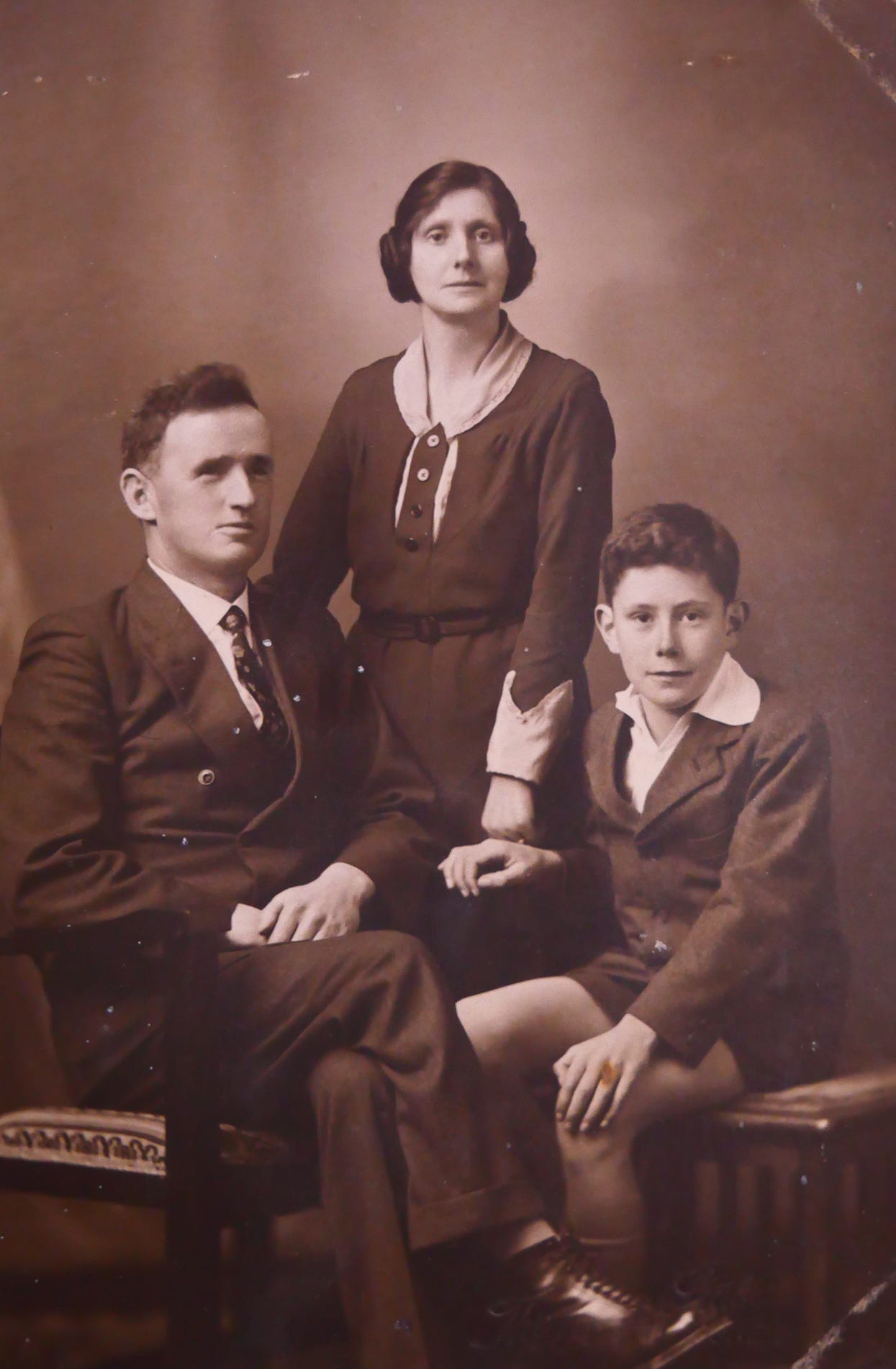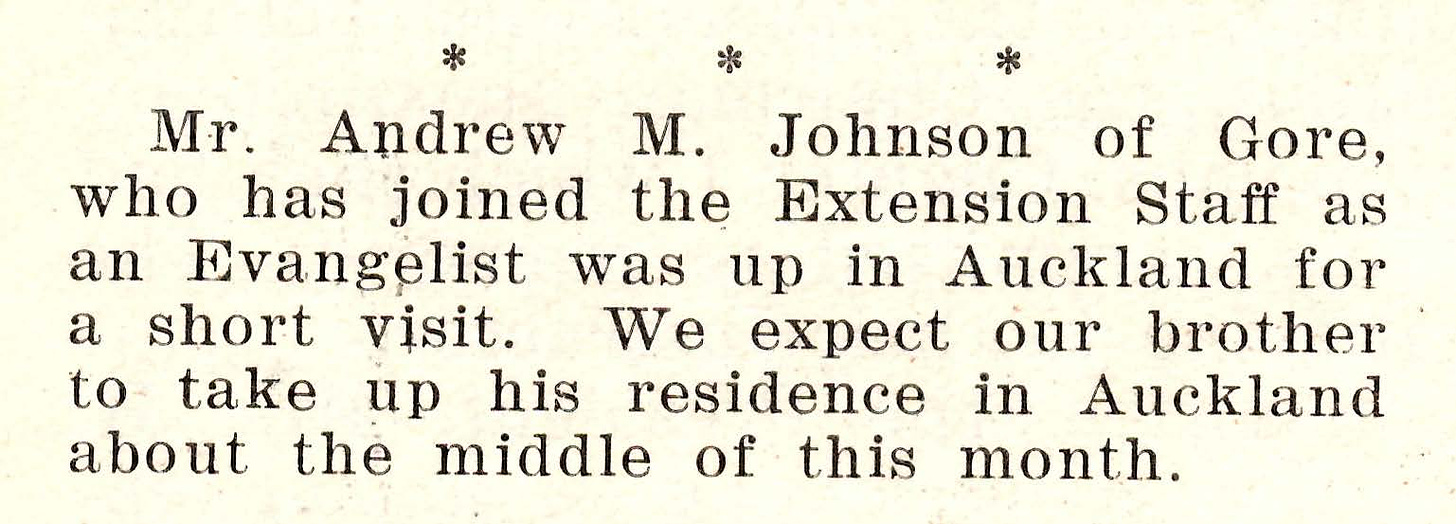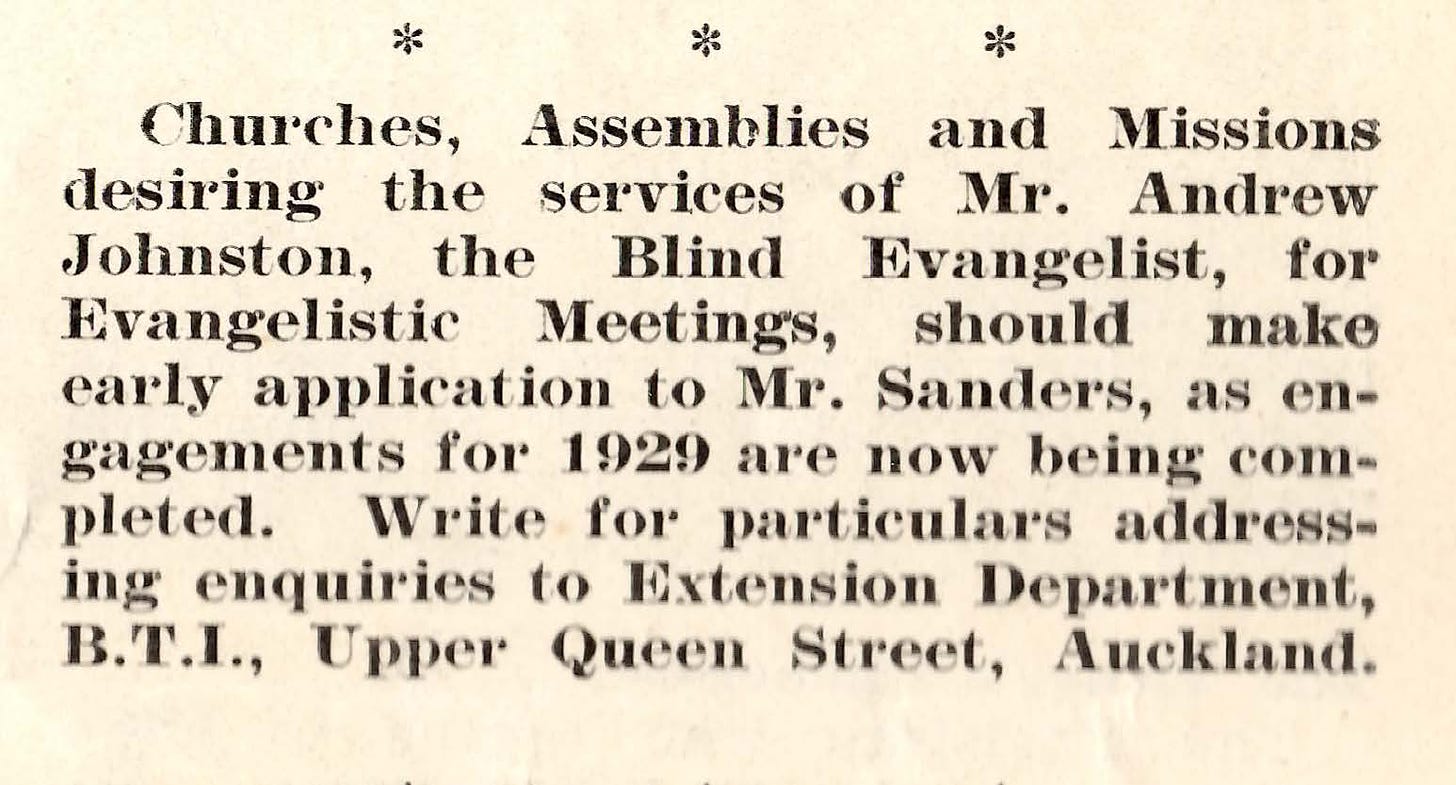When Andrew Johnston agreed to do a fortnight Evangelistic campaign at the Oamaru Baptist Church, the meetings were originally scheduled for March 1928. Preparing a series of messages for such a campaign was a daunting endeavour for a blind man and his wife, but they faithfully undertook the task knowing that it was God's will, at the same time they were grateful that these meetings were to be postponed till May, as this gave them more time for prayer and preparation.
The mission began on Sunday the 5th of May and was concluded on May 21st. Andrew's uncle William Johnston, accompanied Mr and Mrs Johnston to assist them as he had been involved in similar campaigns and evangelistic preaching in the past, as well as, having been involved in the Waikaka Revival. William Johnston set himself the task of canvassing the town, inviting people to the mission and then each night he would intercede for the meetings and his nephew.
The Otago Daily Times reported on the 14th that the Blind Evangelist had, "addressed a large congregation in the Baptist Church"1 and then on the 21st, "The mission has proved very acceptable."2 The Rev. A. Clarke gives us a fuller report:
"We have been looking forward to our mission for some time but before starting we had some special prayer meetings, which were splendidly attended. Mr Johnston, with his uncle, arrived on the Thursday, and we met for prayer up till Sunday, when our mission services commenced. We had some wonderful prayer meetings, and have all received much blessing from them, our mission services have been much blessed, and quite a number have made the great decision... The Sunday evening service taxed the seating accommodation of the church to its utmost, the local Returned Soldiers' Association being present to hear their blind comrade preach. The whole service was marked by intense spirituality and several more came out for their Lord."3 And, "The closing Sunday services were much blest to all, the Communion service in the morning being very largely attended, and at the evening service the church was packed to the doors. We had wonderful meetings throughout the mission, and about 70 came out for their Lord. We had a praise and testimony meeting on Monday evening when quite a large number testified in some way or other to answers to prayer and spiritual uplift. A presentation was also made to Mr Johnston in the form of a wallet of notes, stipulating that it be used to buy some more Braille books."4
One of the volumes that Andrew was able to purchase on the recommendation of Rev. A. Clarke was Dr. R. A. Torrey's, 'What the Bible Teaches.'
As the Johnston's were leaving Oamaru, Andrew remembers, "Mr Clark looked in at the carriage window as the train was pulling out and he said, Andrew, this won't be the end, you know. I wondered what he meant, but I hadn't long to wait."5 On their return to Gore, a thanksgiving service was held at the Gore Baptist Church to celebrate the successful mission.
Shortly after the Oamaru Mission the Johnston's received a letter from Auckland. Mrs Johnston found Andrew in the garden so that she could inform him of the letter's arrival. It was from the Rev. Joseph W. Kemp, inviting Andrew to take up the position of official evangelist in the Extension Department of the Bible Training Institute. J. Harper recounts, "As he stood, resting on his spade and pondering this unexpected proposal, there flashed into his mind the words, 'No man, having put his hand to the plough, and looking back, is fit for the Kingdom of God.'"6
Once the implications of this invitation had been digested, Andrew called his Uncle William for his counsel. William Johnston came round immediately and examined the letter, "it looks like a call Andrew," his uncle said, "Let's have some prayer." After some time, Andrew was impressed with the words, "This is the way, walk ye in it." But this was a heavy matter for Mr and Mrs Johnston's heart. Not only was Andrew's handicap to be considered, but there was a third person to be affected by any decisions, their precious son, George, age 7 at this time. This weighed heavily on Andrew and Nellie's minds. Andrew recounts:
"That night, my wife and I sat by the fireside in the winter evening thinking it over. And the picture of Abraham and Isaac going up the mountainside was brought to our minds. And quietly, Nelly said to me, if we're not prepared to go, God can take our Isaac. Our lad was seven. He meant a great deal to us, but there it was, and we said, yes, we'll go. I trembled to think tonight what a terrible thing it would have been if we had not said yes."7
However, deep in their hearts they knew that this was the will of the Lord and they committed themselves to God's path knowing that He would make the way, so Andrew wrote to the B.T.I. accepting the invitation.
Sometime later Andrew's brother, Alex, who had taken over the family farm of 'Comely Bank,' enquired as to how George was to fit into the plan and offered a place in his home and family for him. This was the perfect solution, as George would still be in a loving home and also George would grow up in the familiar environment of the farm his father had grown up in. They were never to be long apart, however, as the Johnston's returned to Gore whenever there was a sufficient break in the campaign schedule.
In the October edition of 'The Reaper'8 it was advertised that the Johnston's would be joining the B.T.I. Extension Dept. and arrangements were made for them to head northwards to Auckland. In September, the Evangelical community of Gore and the surrounding districts gathered to commission the Johnston's for the Lord's work.9 Once in Auckland they attended some classes at the B.T.I. and undertook some local engagements, specifically a campaign with the Rev. A. S. Wilson, of the Grange Road Baptist Church.
As 1928 came to a close, the Johnston's headed home to Gore, George, and the Pounewea Convention, before they began to travel the length and breadth of New Zealand.
The Reaper Vol VI No 10 Dec 1928 pg 237.
Bibliography:
Dunn, Andrew. (2011). Edith and the Henderson, Johnston, Tayles and Dunn stories.
Harper, J. B. (1964). “Pounawea... and a Promise.” Reaper. October 1964.
Johnston, Andrew. My Life Story. 6th May 1964. Palmerston North.
Thomson, John. (1975). Light in Darkness. https://www.academia.edu/114706955/Light_in_Darkness
Otago Daily Times, Issue 20407, 14 May 1928, Page 12. https://paperspast.natlib.govt.nz/newspapers/ODT19280514.2.97
Otago Daily Times, Issue 20413, 21 May 1928, Page 12. https://paperspast.natlib.govt.nz/newspapers/ODT19280521.2.89
New Zealand Baptist. June 1928. Vol., XLIV, no. 484. p. 189.
New Zealand Baptist. July 1928. Vol., XLIV, no. 485. p. 221.
Johnston, Andrew. My Life Story. 6th May 1964. Palmerston North.
Harper, J. B. (1964). “Pounawea... and a Promise.” Reaper. October 1964. p. 313.
Johnston, Andrew. My Life Story. 6th May 1964. Palmerston North.
The Reaper Vol VI No. 7 Oct. 1928. pg 164.
A full report appeared in the NZ Baptist Vol XLIV No 488 October 1928. p. 313.






